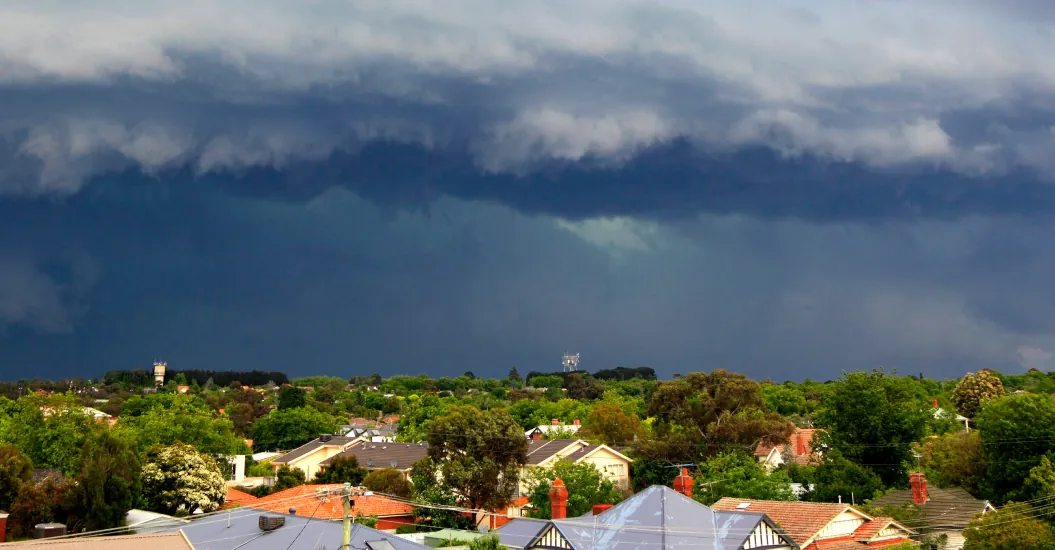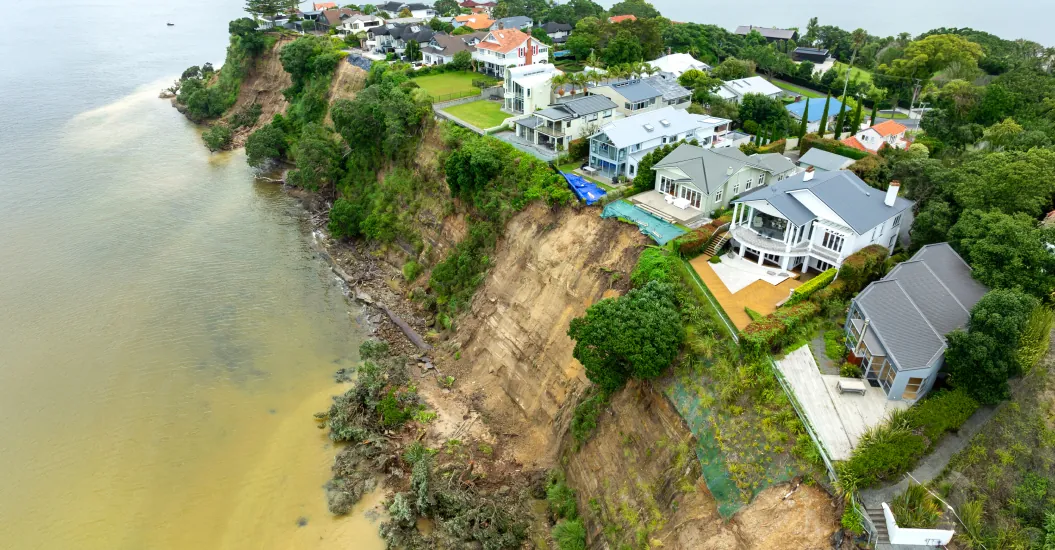Here in Aotearoa, we're used to a bit of wild weather now and then. But every so often, the rain sticks around longer than we'd like. Heavy rain, blocked drains, or rising rivers can quickly lead to flooding, even in places that don't usually seem at risk.
While we can't control the weather, we can be ready for it. Here's a simple guide to help you stay safe and help protect the things you love before, during, and after a flood.
Before a flood
A little bit of prep now can make a big difference later. Here are a few easy things to tick off:
Know your flood risk
Flooding can happen just about anywhere, but some areas are more prone than others, like homes in low-lying areas.¹Visit NIWA's flood maps online or check coastal flood maps from local councils to see if your home is in a flood risk zone.
If you're a Tower customer, you'll see this risk reflected in your house or landlord insurance premium on renewal and you'll be able to see your flood risk in My Tower and on your Certificate of Insurance. We use risk-based pricing, meaning your insurance premium is closely matched to the actual flood risk at your address, not just your postcode. If no flood risk data exists for your specific address, we use community-level data to calculate your premium instead. It's our way of making things fairer and more transparent.
Want to know more about how this works and understand your flood risk a bit better? Learn more about risk-based pricing.
Have a household plan
In a flood, there isn't always time to think on your feet. Having a plan means everyone knows what to do, where to go, and who's doing what. Decide how you'll stay in touch if you're separated, where your safe meeting point is, and what you'll each be responsible for. Check out the Get Ready emergency plan template to get started.
Keep your furry friends in mind too, making sure they're also in your plan. And don't forget about your neighbours, especially if they're elderly or need a hand during emergencies.
Make an emergency grab bag
Put together a few basic essentials like:
- A torch and batteries
- Bottled water and snacks
- First aid kit
- Portable radio
- Phone charger (a power bank is a bonus!)
- Important documents and any medication.
Keep it somewhere easy to grab if you need to head out quickly. Check out our grab bag guide for a more detailed list of what to pack.
A little flood-proofing goes a long way
You don't need to go full DIY-mode to help protect your home. Just a few small jobs can help make a difference:
- Clear your gutters and outside drains, well in advance of a heavy rain forecast. Always do this work in dry conditions to ensure your safety. Here's a guide on keeping your gutters clean.
- Move valuables off the floor, like smaller electronics or anything sentimental. Pop them in waterproof bags for added protection! If your home has a second level or attic space, that's a good spot to put them in.
- Check your doors and windows for any gaps or weak spots where water might sneak in and seal any openings you find with appropriate weatherproofing materials.
- Secure your outdoor gear. Things like bins, outdoor furniture, or BBQs can float or tip over in floodwater and cause more damage.
- Make sure you know how to turn off your power and water. It may pay to do this early to reduce damage and keep your home safer. Remember, if it's already flooded don't attempt to turn off your utilities yourself and instead seek professional help.
- Before the wet weather hits, move your car away from areas prone to flooding, such as near rivers, streams or low-lying areas. Parking your car on higher ground can help avoid any water damage and ensures you'll still have reliable transport when you need it!
Taking photos of your setup before any stormy weather hits can be handy if you need to make a claim later! For more tips on flood prep, check out our blog on how to get your home ready for bad weather.
Check your insurance
Make sure your home and belongings are properly insured for bouncing back if a flood strikes. Our house insurance calculator can give you an estimate of the rebuilding costs, while our contents insurance calculator helps you estimate the value of your contents and how much cover you need.
Check out our house insurance guide and get started!
During a flood
Stay updated
Keep a close watch on updates from Civil Defence, your local council, and MetService. These reliable, official sources will provide the latest information on nearby hazards and let you know if evacuation is likely.
Steer clear of floodwaters
Floodwater may look calm, but it can be fast-moving and much deeper than it looks. Never attempt to walk, swim, or drive through floodwater. It's often contaminated and can be dangerous.
If you're driving and come across floodwater, turn around if it's safe to do so, or pull over and wait until it's clear.
Don't hesitate, evacuate
If authorities tell you to evacuate, don't wait. Grab your essentials, take your grab bag and pets, and leave while it's safe. It's better to go early than risk being trapped by rising water. If you can, check in with neighbours to make sure they're okay.
Power down safely
When floodwaters rise, it's important to minimise potential damage and ensure your safety. If it's safe to do so, here's how to handle your utilities:
- Turn off the water. Locate the main water valve and turn it off securely. This helps reduce the chances of contamination and potential damage to your plumbing.
- Switch off the electricity. Water and electricity are a dangerous mix. If flooding is expected, switch off the electricity at the main breaker. This helps prevent electrical fires and damage to your appliances.
- Shut off the gas. Gas leaks can be hazardous during a flood. Turn off your gas supply at the main valve to avoid any risks of leaks or explosions. If you're not sure how to do this, reach out to your gas provider for support.
After a flood
Once the water recedes, it's time to start the cleanup process.
Wait for the all-clear
Before heading home, make sure the authorities have given the green light. Even if the water has receded, there might still be hidden dangers like damage, sewage contamination, or structural issues.
Flooded areas can still be dangerous, especially if power lines or roads have been affected.
Check your property carefully
Safety first! If your home has flooded, don't switch the utilities on until a professional confirms it's safe. Take lots of photos of the damage before starting the clean-up. These photos can be really helpful for your insurance claim. Most importantly, don't try to fix anything that puts you in danger or could cause more damage to your property.
If you're a Tower customer, you can make a claim for eligible policies online anytime in My Tower. You can save an average of five minutes by making your claim online, and by uploading photos and any supporting documents you can help us validate your claim twice as fast. Log in to My Tower or register here now.
If you rent your home, contact your landlord as soon as possible and let them know about any damage. They'll need to assess the property and arrange for repairs.
NHCover
If a natural disaster like a flood hits your home, the Natural Hazards Commission Toka Tū Ake (NHC), provides limited cover for your land that has been damaged by the flood. If you have a Tower house and/or landlord policy, we will act as your agent for NHC and manage your NHC claim on their behalf.
Temporary accommodation
If your home is uninhabitable, it's important to stay out until the authorities give the all-clear. You might need to stay in temporary accommodation for a while, so it pays to check out your house insurance policy to see what support is available.
If you have house insurance with Tower, you'll have cover for reasonable temporary accommodation costs up to prescribed limits for your home, if your home becomes uninhabitable due to a covered loss, or if you're prevented from entering by government or local officials. This means you can focus on staying safe and comfortable without worrying about the costs.
We know your pets are part of the family too! That's why this benefit even includes kennel or cattery fees for your furry friends.*
Don't forget to keep those accommodation receipts for your claim. Having all the necessary documentation will make the process smoother and faster.
Get in touch with Tower
If you've experienced any damage during the storm and need to make a claim, the quickest and easiest way to do this is through My Tower.** Have your supporting documents handy? Upload them at the same time to help us validate your claim twice as fast. The more information we have, the easier it is for us to process your claim.
Start the cleanup, safely
- Floodwater can carry harmful bacteria and chemicals, so make sure to wear protective clothing. Gloves, boots and a mask are essential while cleaning, and don't forget to wash your hands often.
- Throw out any food or items that have come into contact with the water, especially if they're porous or can't be properly disinfected. It's better to be safe than sorry!
- Take photos of any items you dispose of before they hit the bin.
- Open doors and windows to air things out and reduce mould. If carpets, furniture, or bedding are badly waterlogged, they may need to be removed entirely.
If there's something you can't tackle and need more help with, contact your local council or Civil Defence.
We're here to help
Floods can be stressful, but with these tips, you'll be better prepared and ready to tackle the situation with confidence.
If the unexpected happens and you need to make a claim, we're here for you every step of the way. For more support, the quickest way to reach us is in My Tower.
*For all of these benefits, please read the policy wording and cover documents to understand the terms, conditions, excesses, limits and exclusions that may apply.
The links we provide to third-party websites are for your convenience and do not constitute any endorsement or authorisation by us. The information provided on this page is general in nature and is not intended to be professional or legal advice. Tower does not accept any liability for the accuracy or content of information on this website that belongs to third parties or on any third-party website.

Looking for house insurance?
Save $200 on new, eligible house insurance policies with promo code SWEETDEAL.*






